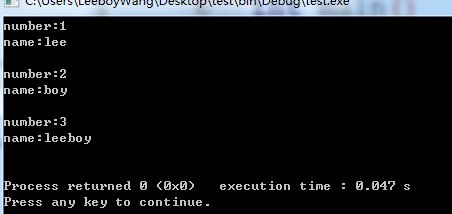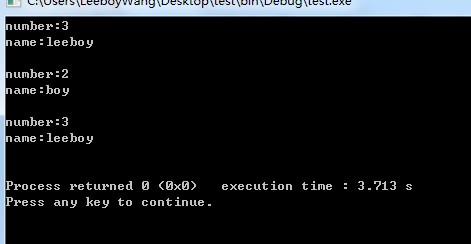类中使用操作符,希望明了易懂,可以通过重载操作符,使自定义类使用操作符像一般类使用一样简洁。如何自定义操作符?其实操作符的重载相当于函数的重载(代码中标注)。
下面以“+”的重载为例子。
#ifndef STUDENT_H
#define STUDENT_H
#include
using namespace std;
class student
{
public:
student();
student(int num, string name);
void print();
student operator+(const student& st);//重载+操作符,形参为const引用,系统不再调用复制构造函数,直接使用传入源参,提高效率。
virtual ~student();
protected:
private:
int number;
string name;
};
#endif // STUDENT_H#include "../include/student.h"
student::student()
{
number = 0;
name = "";
}
student::student(int num, string name)
{
//ctor
number = num;
this->name = name;
}
void student::print()
{
cout<
cout<
cout<
}
student student::operator+(const student& st)
{
student st1;
st1.name = name + st.name;
st1.number = number + st.number;
return st1;
}
student::~student()
{
//dtor
}
#include
#include "include/student.h"
using namespace std;
int main()
{
student st1(1,"lee");
student st2(2,"boy");
student st3;
st3 = st1 + st2;/*操作符+的使用就像一般调用函数一样。此处还可以写成st3 = st1.operator+(st2); st1.operator+(st2)的返回值为student的一个副本,也就是st1 + st2为返回的副本。多数时操作符重载会使用返回引用,也就是无需复制构造的过程(但被引用的对象会被修改,如果这里使用返回引用,则只能使用修改当前对象st1的方法:student& student::operator+(const student& st)
{
name = name + st.name;
number = number + st.number;
return *this;
})。*/
st2.print();
st3.print();
return 0;
}

使用返回引用的方法:

其他操作符重载
.h文件
#pragma once
#include
using namespace std;
class Book
{
friend ostream& operator<
friend istream& operator>>(istream &ist, Book &bk);
public:
Book(void);
Book(string str, int id);
~Book(void);
public:
//重载声明
Book& operator=(const Book &bk);
Book& operator+=(const Book &bk);
Book operator+(const Book &bk);
Book& operator[](int num);
//int只是用来区别前加还是后加,放在哪个里边都可以
Book operator++(); //后++
Book& operator++(int); //前++
private:
string m_sName;
int m_iId;
};
.cpp文件 部分代码省略
Book::Book(string str, int id):m_sName(str), m_iId(id)
{
}
Book& Book::operator=(const Book &bk)
{
this->m_sName = bk.m_sName;
this->m_iId = bk.m_iId;
return *this;
}
Book& Book::operator+=(const Book &bk)
{
this->m_sName += bk.m_sName;
this->m_iId += bk.m_iId;
return *this;
}
Book Book::operator+(const Book &bk)
{
Book t_Bk = *this;
t_Bk += bk;//调动+=,修改类时,只需修改+
return t_Bk;
}
Book& Book::operator[](int num)
{
return *(this+num); //下标操作就是一定量的偏移
}
//后++
Book Book::operator++()
{
Book temp = *this;
this->m_iId++;
return temp;
}
//前++
Book& Book::operator++(int)
{
this->m_iId++;
return *this;
}
主程序:
// OverOperator.cpp : 定义控制台应用程序的入口点。
//
#include "stdafx.h"
#include "Book.h"
#include
ostream& operator<
istream& operator>>(istream &ist, Book &bk);
int _tmain(int argc, _TCHAR* argv[])
{
//Book book1("lee",566);
//Book book2 = book1;//=重载
//Book book3 = book2;
//book3 += book1;//+=重载
//Book book4 = book1 + book2; //+重载
//流重载测试
//cout << book2 <
//cout << book3 <
//cout << book4 <
/*Book bk1,bk2;
cin >> bk1 >> bk2;
cout << bk1 << bk2;*/
//[]重载测试
/*Book *bk = new Book[5];
cin >> bk[1];
cin >> bk[2];
cout << bk[2] << bk[1];*/
//++运算测试
Book book1("lee",566);
//运算是从右往左运行的:名字:leeID号码:568名字:leeID号码:567名字:leeID号码:568
cout << book1 << book1++ << ++book1;
system("pause");
return 0;
}
/*
* 返回类型不是类的类型,无法将重载操作符函数作为类的成员函数,因此使用友元方式。
* 对于<
* 建议只有=,+=定义为类成员,其他操作符用友元实现
*/
ostream& operator<
{
ost << "名字:" << bk.m_sName << "ID号码:" << bk.m_iId ;
return ost;
}
istream& operator>>(istream &ist, Book &bk)
{
ist >> bk.m_sName >> bk.m_iId;
return ist;
}






















 被折叠的 条评论
为什么被折叠?
被折叠的 条评论
为什么被折叠?








